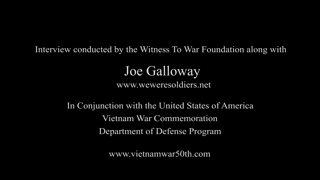6:29 | "Don't shoot! They're our people!" That was the order but Henry Dunn resumed fire at the targets he had who were wearing pith helmets. The ambush at Landing Zone Albany had raged for hours when someone finally got some air support called in. The A-1E's dropped napalm to the cheers of the surviving soldiers. Part 3 of 4.
Keywords : Henry Dunn Vietnam Ia Drang Valley A-1E Skyraider Joel Sugdinis LZ Albany pith helmet napalm North Vietnamese Bill Lund Forward Observer (FO) Joe Galloway

Henry Dunn thought he had it made in the Army but then he got "volunteered" for Vietnam because he was the only single officer in the outfit. Attached to the 7th Cavalry as a forward observer, he shipped out with the newly formed air mobile division. He was a little disturbed when they were issued no ammunition before they went ashore. Then there was that smell.
The Battle of Ia Drang Valley had raged for hours when Henry Dunn's unit was moved in for support. They listened all night to the sound of the fight and then advanced the next morning. They immediately manned the perimeter and Dunn began his work as Forward Observer, calling in areas of concentration for artillery fire. Part 1 of 4.
The first two days of the Battle of Ia Drang valley behind them, the American units remaining at the battlefield began the ill-fated march to Landing Zone Albany. Already exhausted, Henry Dunn moved out with the others and as they neared their destination, the ambush began. Sporadic gunfire at first, then mortar rounds. Part 2 of 4.
After the enemy faded away from the ambush at Landing Zone Albany, the really hard work began, finding the dead and wounded. There were more of them than there were men standing. Henry Dunn says the stench of the burned and decaying bodies in the tropical heat never left his nostrils. Part 4 of 4.
After his intense experience at the Battle of the Ia Drang Valley. Henry Dunn finally got to do the job for which he was trained when he acted as air observer during the Bong Son operation. The coordination of artillery and air power while flying over the battlefield was very exciting, and the pure exhilaration of those two hours could only be celebrated one way.
For Henry Dunn, the best day of his Vietnam tour was the day he got the call on the way into battle. Turn around and come back to base. You're going home. He fondly recalls the Australian allied troops and says that, years later, Australians credited America with slowing the advance of Communism in their neighborhood.
Henry Dunn's life when he returned from Vietnam was a whirlwind of marriage, career and children, so he was too busy to process his war experience. That changed when accounts of the Battle of the Ia Drang Valley were published and he began to reach out to fellow veterans.
The battle at Landing Zone Albany was the defining moment of his life, says Henry Dunn. He wanted more than anything to react properly in combat and spending his formative years as a hunter helped him with that. He worries that no amount of preparation can help the veterans of today, who are coping with multiple prolonged deployments.
What is the lesson to be learned from the Vietnam War? For Henry Dunn it is simple, don't get into a war unless you absolutely have to.